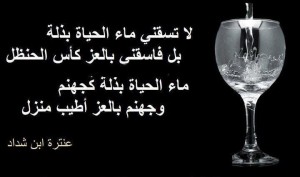
(Click to enlarge.)
The Bible and the Book of Mormon both clearly teach that the Lord works through particular lineages, chosen peoples, selected families.
However, today’s reading, 2 Nephi 30, makes it clear that these aren’t exclusive clubs. Those chosen people aren’t necessarily more righteous than others, and righteous outsiders can, through their faithfulness, be effectively adopted into the chosen people.
“For,” in the words of the apostle Paul, “they are not all Israel, which are of Israel” (Romans 9:6).
As John the Baptist put it, speaking to his unrighteous fellow countrymen, “Think not to say within yourselves, We have Abraham to our father: for I say unto you, that God is able of these stones to raise up children unto Abraham” (Matthew 3:9).
I’ve always liked the story of the pre-Islamic Arab hero and poet ‘Antarah b. Shaddad:
Born to a respected Arab leader and a slave girl, he himself was raised a slave. One day, though, his paternal tribe was under attack and was losing. He stood looking on, holding the reins of his father’s camel. Eventually, his father begged his help, but he coolly replied that a slave was good only for tending goats and running errands. “Alright!” his father cried. “You’re free! Now help us!” Whereupon ‘Antarah went out into the fray and, virtually singlehandedly, saved the day for his tribe.
But he nonetheless continued, for a long time, to be looked down upon by others for his low birth.
Finally, when one high-born Arab mocked him yet again as the son of a slave, he famously responded: “You represent the end of the honor of your line. I represent the beginning of the honor of mine.”
Humility may not have been first among his virtues, but he certainly rose above his origin. Here is a loose translation (not by me) of the quotation in the image above:
Give me not the drink of life in servitude,
But in pride give me a drink of bitterness.
The water of life is hell in servitude,
and Hades in pride is a land of bliss.
That’s a bit far afield, I readily admit, from 2 Nephi 30. But the basic point remains: We won’t be saved by mere genealogical descent. And the prestige of a great father or a beloved mother or a distinguished ancestor doesn’t automatically transfer to a lazy loser child. On the other hand, if you don’t come from a distinguished family, you can, nonetheless, work to make your family distinguished.











